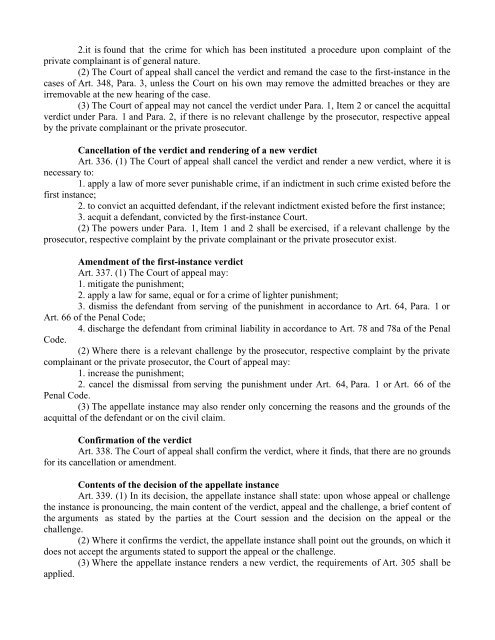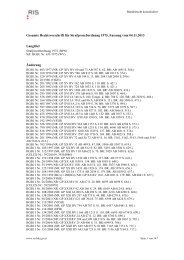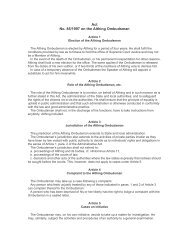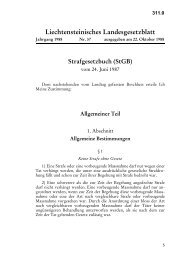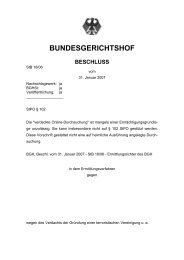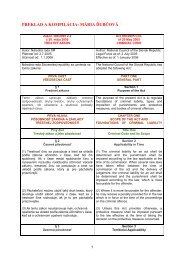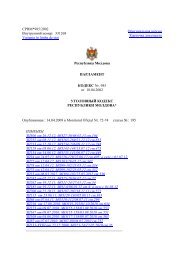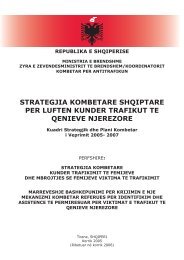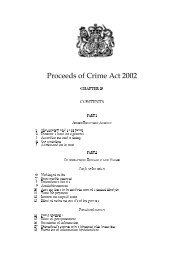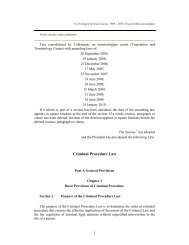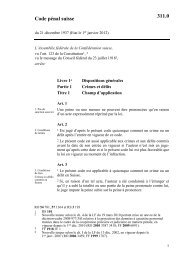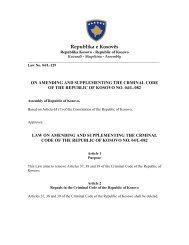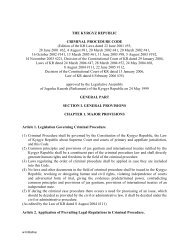PENAL PROCEDURE CODE In force from 29.04 ... - Legislationline
PENAL PROCEDURE CODE In force from 29.04 ... - Legislationline
PENAL PROCEDURE CODE In force from 29.04 ... - Legislationline
Create successful ePaper yourself
Turn your PDF publications into a flip-book with our unique Google optimized e-Paper software.
2.it is found that the crime for which has been instituted a procedure upon complaint of the<br />
private complainant is of general nature.<br />
(2) The Court of appeal shall cancel the verdict and remand the case to the first-instance in the<br />
cases of Art. 348, Para. 3, unless the Court on his own may remove the admitted breaches or they are<br />
irremovable at the new hearing of the case.<br />
(3) The Court of appeal may not cancel the verdict under Para. 1, Item 2 or cancel the acquittal<br />
verdict under Para. 1 and Para. 2, if there is no relevant challenge by the prosecutor, respective appeal<br />
by the private complainant or the private prosecutor.<br />
Cancellation of the verdict and rendering of a new verdict<br />
Art. 336. (1) The Court of appeal shall cancel the verdict and render a new verdict, where it is<br />
necessary to:<br />
1. apply a law of more sever punishable crime, if an indictment in such crime existed before the<br />
first instance;<br />
2. to convict an acquitted defendant, if the relevant indictment existed before the first instance;<br />
3. acquit a defendant, convicted by the first-instance Court.<br />
(2) The powers under Para. 1, Item 1 and 2 shall be exercised, if a relevant challenge by the<br />
prosecutor, respective complaint by the private complainant or the private prosecutor exist.<br />
Amendment of the first-instance verdict<br />
Art. 337. (1) The Court of appeal may:<br />
1. mitigate the punishment;<br />
2. apply a law for same, equal or for a crime of lighter punishment;<br />
3. dismiss the defendant <strong>from</strong> serving of the punishment in accordance to Art. 64, Para. 1 or<br />
Art. 66 of the Penal Code;<br />
4. discharge the defendant <strong>from</strong> criminal liability in accordance to Art. 78 and 78a of the Penal<br />
Code.<br />
(2) Where there is a relevant challenge by the prosecutor, respective complaint by the private<br />
complainant or the private prosecutor, the Court of appeal may:<br />
1. increase the punishment;<br />
2. cancel the dismissal <strong>from</strong> serving the punishment under Art. 64, Para. 1 or Art. 66 of the<br />
Penal Code.<br />
(3) The appellate instance may also render only concerning the reasons and the grounds of the<br />
acquittal of the defendant or on the civil claim.<br />
Confirmation of the verdict<br />
Art. 338. The Court of appeal shall confirm the verdict, where it finds, that there are no grounds<br />
for its cancellation or amendment.<br />
Contents of the decision of the appellate instance<br />
Art. 339. (1) <strong>In</strong> its decision, the appellate instance shall state: upon whose appeal or challenge<br />
the instance is pronouncing, the main content of the verdict, appeal and the challenge, a brief content of<br />
the arguments as stated by the parties at the Court session and the decision on the appeal or the<br />
challenge.<br />
(2) Where it confirms the verdict, the appellate instance shall point out the grounds, on which it<br />
does not accept the arguments stated to support the appeal or the challenge.<br />
(3) Where the appellate instance renders a new verdict, the requirements of Art. 305 shall be<br />
applied.


